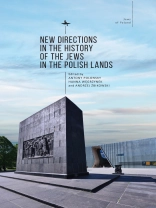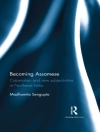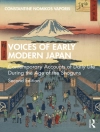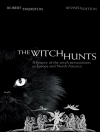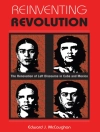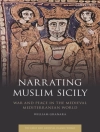This volume is made up of essays first presented as papers at the conference held in May 2015 at POLIN Museum of the History of Polish Jews in Warsaw. It is divided into two sections. The first deals with museological questions—the voices of the curators, comments on the POLIN museum exhibitions and projects, and discussions on Jewish museums and education. The second examines the current state of the historiography of the Jews on the Polish lands from the first Jewish settlement to the present day.
Making use of the leading scholars in the field from Poland, Eastern and Western Europe, North America, and Israel, the volume provides a definitive overview of the history and culture of one of the most important communities in the long history of the Jewish people.
Зміст
Introduction Antony Polonsky, Hanna Węgrzynek, Andrzej Żbikowski Part I Museological Questions The Voice of the Curators Something Old, Something New: Creating the Narrative for the Early Modern Galleries Adam Teller The Nineteenth-Century Gallery Sam Kassow The Interwar Gallery Sam Kassow Curatorial and Educational Challenges in Creating the Holocaust Gallery Maria Ferenc Piotrowska, Kamila Radecka-Mikulicz, Justyna Majewska Assumptions behind the Postwar Section of the Core Exhibition at POLIN Stanisław Krajewski Comments on the Museum Polish-Jewish Historiography 1970–2015: Construction, Consensus, Controversy Moshe Rosman POLIN, The Medieval and Early Modern Galleries: A Comment Kenneth Stow Modernism and Identity. Polish Jews Facing Change in the Nineteenth Century Tomasz Kizwalter Hasidism in the Museum, from a Social History Perspective David Assaf What’s in, What’s out: A Critique of the Interwar Gallery Michael Steinlauf The Truth and Nothing But: The Holocaust Gallery of the Warsaw POLIN Museum in Context Omer Bartov Perspectives: A Lithuanian Visit to the POLIN Museum Holocaust Gallery Saulius Suziedelis Polin: A Bildungsroman Marci Shore A Historian’s Response. Comments on the Gallery “After the War” Andrzej Paczkowski Museums and Education Jewish Tourism to Poland: The Opportunities for New Museum Narratives to Recontextualize Jewish Histories Jonathan Webber Jewish Museums in Moscow Vika Mochalova The Challenges of New Work in History and Education about the Holocaust in Poland Jolanta Ambrosewicz-Jacobs Part II Historiographic Questions Premodern Poland–Lithuania Did the Polish Nobility Take Seriously the Teaching of the Catholic Church? Reflections on the Relations between the Nobility, the Church, and the Jews Adam Kaźmierczyk Relations between Jews and Non-Jews in the Polish–Lithuanian Commonwealth: Perceptions and Practices Jurgen Heyde Agreements between Towns and Kahals and Their Impact on the Legal Status of Polish Jews Hanna Węgrzynek The Role and Significance of Jews in the Economy of the Polish-Lithuanian Commonwealth: The State of Research and Research Directions Jacek Wijaczka A Reassessment of the Jewish Poll-Tax Assessment Lists in Eighteenth-Century Crown Poland Judith Kalik Frankism: The History of Jacob Frank or of the Frankists Jan Doktór The Nineteenth Century Modern Times Polish Style? Orthodoxy, Enlightenment, and Patriotism Israel Bartal Jew-Hatred and Anti-Jewish Violence in the Former Lands of the Polish–Lithuanian Commonwealth during the Long Nineteenth Century Darius Staliūnas Those Who Stayed: Women and Jewish Traditionalism in East Central Europe Glenn Dynner Pauline Wengeroff: Between Tradition and Modernity, East and West Shulamit Magnus The Interwar Years One Jewish Street? Reflections on Unity and Disunity in Interwar Polish Jewry Gershon Bacon Not Just Mały Przegląd: The Ideals and Educational Values Expressed in Jewish Polish-Language Journals for Children and Young Adults Anna Landau-Czajka Legitimizing the Revolution: Sarah Schenirer and the Rhetoric of Torah Study for Girls Naomi Seidman Contested Jewish Polishness: Language and Health as Markers for the Position of Jews in Polish Culture and Society in the Interwar Period Katrin Steffen The Holocaust Historiography on the Holocaust in Poland: An Outsider’s View of Its Place within Recent General Developments in Holocaust Historiography Dan Michman The Dispute over the Status of a Witness to the Holocaust: Some Observations on How Research into the Destruction of the Polish Jews and into Polish–Jewish Relations during the Years of Nazi Occupation Have Changed since 1989 Andrzej Żbikowski Beyond National Identities: New Challenges in Writing the History of the Holocaust in Poland and Israel Daniel Blatman The Postwar Period Violence against Jews in Poland, 1944–47: The State of Research and Its Presentation Grzegorz Berendt The Jews and the “Disavowed Soldiers” August Grabski In or Out? Identities and Images of Poland among Polish Jews in the Postwar Years Audrey Kichelewski
Про автора
Antony Polonsky is Emeritus Professor of Holocaust Studies at Brandeis University and Chief Historian of POLIN Museum of the History of Polish Jews, Warsaw. Until 1991, he was Professor of International History at the London School of Economics and Political Science. He is co-chair of the editorial board of Polin: Studies in Polish Jewry. His most recent work is The Jews in Poland and Russia, Volume 1, 1350 to 1881; Volume 2, 1881 to 1914; Volume 3, 1914 to 2008 (Oxford, 2010, 2012), published in 2013 in an abridged version, The Jews in Poland and Russia: A Short History.
Hanna Węgrzynek is a chief specialist for research and historical projects at POLIN Museum of the History of Polish Jews in Warsaw. Among her books are “Czarna legenda” Żydów: procesy mordy rytualne w dawnej Polsce (The Jewish “Black Legend”: Blood Libel Trials in Old Poland, Warsaw, 1995) and Historia i kultury Żydów polskich: słownik (History and Culture of Polish Jews: A Reference Book), in cooperation with Alina Cała and Gabriela Zalewska (Warsaw, 2000).
Andrzej Żbikowski has worked at the Jewish Historical Institute since 1985. Among his books are an illustrated history entitled Żydzi (Jews) in the series A to Polska właśnie and U genezy Jedwabnego: Żydzi na Kresach Północno-Wschodnich II Rzeczypospolitej : wrzesień 1939-lipiec 1941 (The Origins of Jedwabne. Jews in the North-eastern Borderlands of the Second Republic: September 1939-July 1941, Warsaw, 2006).
